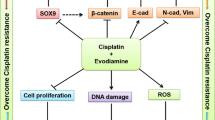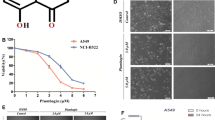Abstract
Petasites japonicus is a traditional medicine in Korea for treating carcinoma, bronchitis, and asthma. However, the molecular mechanisms of anti-cancer activity are not well understood. The purpose of this study was to confirm the anti-cancer activity of P. japonicus and its mechanism. Apoptosis was examined using morphological observation of nuclear changes and flow cytometry. Activation of apoptosis-related markers was detected. P. japonicus extract significantly inhibited HeLa cell growth in vitro in a dose-dependent manner. Induction of apoptosis by P. japonicus was mediated by up-regulation of Bax and down-regulation of Bcl-2. P. japonicus also activated caspase-9, capspase-3, and PARP, indicating induction of the mitochondrial intrinsic apoptosis pathway. We also confirmed that administration of P. japonicus significantly reduced tumor weight in the xenografted mice. Thus, P. japonicus was effective for inhibiting tumor growth in vitro and in vivo by inducing apoptosis, suggesting its usefulness as a potential anti-cancer agent.
Similar content being viewed by others
References
Jacobson MD, Weil M, Raff MC. Programmed cell death in animal development. Cell 88: 347–354 (1997)
Thompson CB. Apoptosis in the pathogenesis and treatment of disease. Science 267: 1456–1462 (1995)
Hengartner MO. The biochemistry of apoptosis. Nature 407: 770–776 (2000)
Lee EW, Seo J, Jeong M, Lee S, Song J. The roles of FADD in extrinsic apoptosis and necroptosis. BMB Rep. 45: 496–508 (2012)
Kroemer G, Galluzzi L, Brenner C. Mitochondrial membrane permeabilization in cell death. Physiol. Rev. 87: 99–163 (2007)
Thorburn A. Death receptor-induced cell killing. Cell. Signal. 16: 139–144 (2004)
Wang X. The expanding role of mitochondria in apoptosis. Gene. Dev. 15: 2922–2933 (2001)
Wu J, Liu T, Xie J, Xin F, Guo L. Mitochondria and calpains mediate caspase-dependent apoptosis induced by doxycycline in HeLa cells. Cell. Mol. Life Sci. 63: 949–957 (2006)
Lee JC, Kim J, Jang YS. Ethanol-eluted extract of Rhus verniciflua stokes inhibits cell growth and induces apoptosis in human lymphoma cells. J. Biochem. Mol. Biol. 36: 337–343 (2003)
Li J, Li Q, Feng T, Li K. Aqueous extract of Solanum nigrum inhibit growth of cervical carcinoma (U14) via modulating immune response of tumor bearing mice and inducing apoptosis of tumor cells. Fitoterapia 79: 548–556 (2008)
Upur H, Yusup A, Baudrimont I, Umar A, Berke B, Yimit D, Lapham JC, Creppy EE, Moore N. Inhibition of cell growth and cellular protein, DNA and RNA synthesis in human hepatoma (HepG2) cells by ethanol extract of abnormal Savda Munziq of traditional Uighur medicine. Evid.-Based Compl. Alt. 2011: 251424 (2011)
Cho BS, Lee JJ, Ha JO, Lee MY. Physiochemical composition of Petasites japonicus S. et Z. Max. Korean J. Food Preserv. 13: 661–667 (2006)
Hwang KA, Hwang YJ, Park DS, Kim JH, Om AS. In vitro investigation of antioxidant and anti-apoptotic activities of Korean wild edible vegetable extracts and their correlation with apoptotic gene expression in HepG2 cells. Food Chem. 125: 483–487 (2011)
Zhang FJ, Wang Q, Wang Y, Guo ML. Anti-allergic effects of total bakkenolides from Petasites tricholobus in ovalbumin-sensitized rats. Phytother. Res. 25: 116–121 (2011)
Lee JS, Yang EJ, Yun CY, Kim DH, Kim IS. Suppressive effect of Petasites tricholobus extract on ovalbumin-induced airway inflammation in an asthmatic mouse model. J. Ethnopharmacol. 133: 551–557 (2011)
Sok DE, Oh SH, Kim YB, Kang HG, Kim MR. Neuroprotection by extract of Petasites tricholobus leaves, a traditional vegetable, against oxidative stress in brain of mice challenged with kainic acid. Eur. J. Nutr. 45: 61–69 (2006)
Kang HG, Jeong SH, Cho JH. Antimutagenic and anticarcinogenic effect of methanol extracts of Petasites tricholobus Maxim leaves. J. Vet. Sci. 11: 51–58 (2010)
Xiao XY, Hao M, Yang XY, Ba Q, Li M, Ni SJ, Wang LS, Du X. Licochalcone A inhibits growth of gastric cancer cells by arresting cell cycle progression and inducing apoptosis. Cancer Lett. 302: 69–75 (2011)
Ko SG, Koh SH, Jun CY, Nam CG, Bae HS, Shin MK. Induction of apoptosis by Saussurea lappa and Pharbitis nil on AGS gastric cancer cells. Biol. Pharm. Bull. 27: 1604–1610 (2004)
Rouleau M, Patel A, Hendzel MJ, Kaufmann SH, Poirier GG. PARP inhibition: PARP1 and beyond. Nat. Rev. Cancer 10: 293–301 (2010)
Narrima P, Paydar M, Looi CY, Wong YL, Taha H, Wong WF, Ali Mohd M, Hadi AH. Persea declinata (Bl.) kosterm bark crude extract induces apoptosis in MCF-7 cells via G0/G1 cell cycle arrest, Bcl-2/Bax/Bcl-xl signaling pathways, and ROS generation. Evid.-Based Compl. Alt. 2014: 14 (2014)
Shimizu S, Eguchi Y, Kamiike W, Waguri S, Uchiyama Y, Matsuda H, Tsujimoto Y. Bcl-2 blocks loss of mitochondrial membrane potential while ICE inhibitors act at a different step during inhibition of death induced by respiratory chain inhibitors. Oncogene 13: 21–29 (1996)
Kroemer G, Zamzami N, Susin SA. Mitochondrial control of apoptosis. Immunol. Today 18: 44–51 (1997)
Hashemi SR, Zulkifli I, Bejo MH, Farida A, Somchit MN. Acute toxicity study and phytochemical screening of selected herbal aqueous extract in broiler chickens. Int. J. Pharmacol. 4: 352–360 (2008)
Shimoda H, Tanaka J, Yamada E, Morikawa T, Kasajima N, Yoshikawa M. Anti type I allergic property of Japanese butterbur extract and its mast cell degranulation inhibitory ingredients. J. Agr. Food Chem. 54: 2915–2920 (2006)
Lee HJ, Wang CJ, Kuo HC, Chou FP, Jean LF, Tseng TH. Induction apoptosis of luteolin in human hepatoma HepG2 cells involving mitochondria translocation of Bax/Bak and activation of JNK. Toxicol. Appl. Pharm. 203: 124–131 (2005)
Ko WG, Kang TH, Lee SJ, Kim YC, Lee BH. Effects of luteolin on the inhibition of proliferation and induction of apoptosis in human myeloid leukaemia cells. Phytother. Res. 16: 295–298 (2002)
Hwang YJ, Lee EJ, Kim HR, Hwang KA. Molecular mechanisms of luteolin-7-O-glucoside-induced growth inhibition on human liver cancer cells: G2/M cell cycle arrest and caspase-independent apoptotic signaling pathways. BMB Rep. 46: 611–616 (2013)
Chang WC, Hsieh CH, Hsiao MW, Lin WC, Hung YC, Ye JC. Caffeic acid induces apoptosis in human cervical cancer cells through the mitochondrial pathway. Taiwan. J. Obstet. Gyne. 49: 419–424 (2010)
Ma XH, Zheng CJ, Han LY, Xie B, Jia J, Cao ZW, Li YX, Chen YZ. Synergistic therapeutic actions of herbal ingredients and their mechanisms from molecular interaction and network perspectives. Drug Discov. Today 14: 579–588 (2009)
Wagner H, Ulrich-Merzenich G. Synergy research: Approaching a new generation of phytopharmaceuticals. Phytomedicine 16: 97–110 (2009)
Author information
Authors and Affiliations
Corresponding author
Rights and permissions
About this article
Cite this article
Hwang, YJ., Wi, HR., Kim, HR. et al. Induction of apoptosis in cervical carcinoma HeLa cells by Petasites japonicus ethanol extracts. Food Sci Biotechnol 24, 665–672 (2015). https://doi.org/10.1007/s10068-015-0087-y
Received:
Revised:
Accepted:
Published:
Issue Date:
DOI: https://doi.org/10.1007/s10068-015-0087-y




